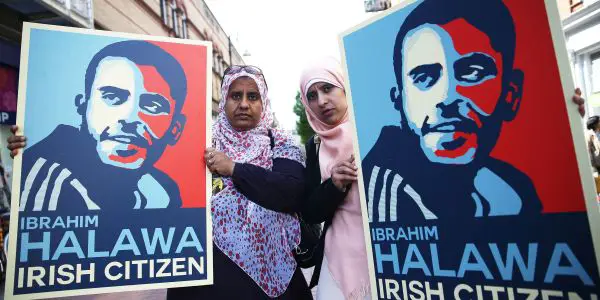A 20-year-old Irish man jailed in Egypt for the last 1,000 days as he awaits trial and a potential death penalty has said his incarceration has felt like 1,000 years.
Ibrahim Halawa’s family and supporters are holding an awareness day on Dublin’s Grafton Street to allow people to see pictures of him and to learn about his detention.
Arrested in Cairo aged just 17 in the midst of protests over the ousting of the Muslim Brotherhood in Cairo, he has been held without trial for almost three years and is due to face justice as part of a mass trial in late June.
His family released a section of a letter he wrote to them in the last week to mark the 1,000 days.
Mr Halawa wrote: “One thousand days with 1,000 different stories. Sadly not the type of joy, laughter and smiles. But rather the type full of suffering, pain, torture, tears, abuse, suicide, and death.
“One thousand days that have felt like 1,000 years. Not only for me but for hundreds behind bars.
“One thousand days for something I believe people should be able to live in just as I do back home, in a free democratic country.
“One thousand days and 1,000 more if it takes to be free. Some have lost hope and written THE END on their story, but I leave many blank pages to be filled.”
The Halawa family insist his imprisonment is unlawful and unjust.
One of Mr Halawa’s sisters, Somaia, said: “We want to come together to show Ibrahim our support and that we haven’t forgotten him.
“We also want to call on an end to this nightmare. We call on more serious and assertive action to be taken to help free Ibrahim.”
The Halawas insist Ibrahim has been jailed without a fair trial and no adequate access to a lawyer, and claim he has been electrocuted, beaten, spat on and moved without his family’s knowledge.
They have also criticised the efforts of the Department of Foreign Affairs over what they claim is a “softly, softly” approach by diplomats with Egyptian authorities.
Foreign Affairs Minister Charlie Flanagan has ordered talks amid the controversy of Mr Halawa being moved from prison to prison, and sent Ireland’s ambassador to Egypt Damien Cole to discuss the matter with officials in Cairo. He has also brought in the Egyptian ambassador Soha Gendi in Dublin as part of the diplomatic process.
Mr Halawa’s family have set up an information stall on Grafton Street to create awareness of his plight.
Lynn Boylan, Sinn Fein MEP and one of their most vocal supporters, called on Ireland to seek Mr Halawa’s release under a “presidential decree”.
“I am asking the incoming government and in particular the new Independent ministers to intercede on Ibrahim’s behalf. In particular I ask (Children’s) Minister Katherine Zappone TD from Ibrahim’s constituency to speak for Ibrahim at the cabinet table.”
Ms Boylan called on the new cabinet members to ask Taoiseach Enda Kenny to take up the case personally and seek the Egyptian presidential decree.
The London-based Reprieve organisation, which has campaigned for the Halawas and opposes the death penalty, reiterated calls for his release.
“It is a scandal that the Egyptian authorities continue to seek the death penalty for Ibrahim despite his having been a child at the time of his arrest,” Harriet McCulloch, deputy director of the death penalty team, said.
“The Egyptian authorities must immediately call an end to this mass trial and others like it and release Ibrahim and the hundreds of others like him who have been illegally detained for so long.”
He was 17 when he was detained while taking refuge in a mosque near Cairo’s Ramses Square as a “day of rage” was held over the removal of president Mohamed Morsi.
The mass trial he is facing, along with more than 400 others, has been repeatedly postponed since his detention in 2013.
Amnesty International met with the Egyptian ambassador in Dublin this week and warned that her previous comments on the case had been outrageous.
Irish director Colm O’Gorman said: ” The ambassador’s assertion that torture is not an issue in Egypt is simply not credible.
“Egyptian law’s definition of what constitutes a ‘terrorist act’ is overly broad and grants the authorities free rein to detain peaceful government critics, including journalists, on vague grounds.”
Reprieve launched an online petition calling for Egyptian president Abdel Fattah al-Sisi to free Ibrahim and end mass trials.
It was more than halfway to its 10,000 target within a few hours of going live.
